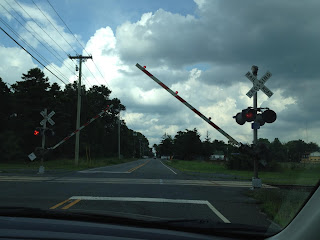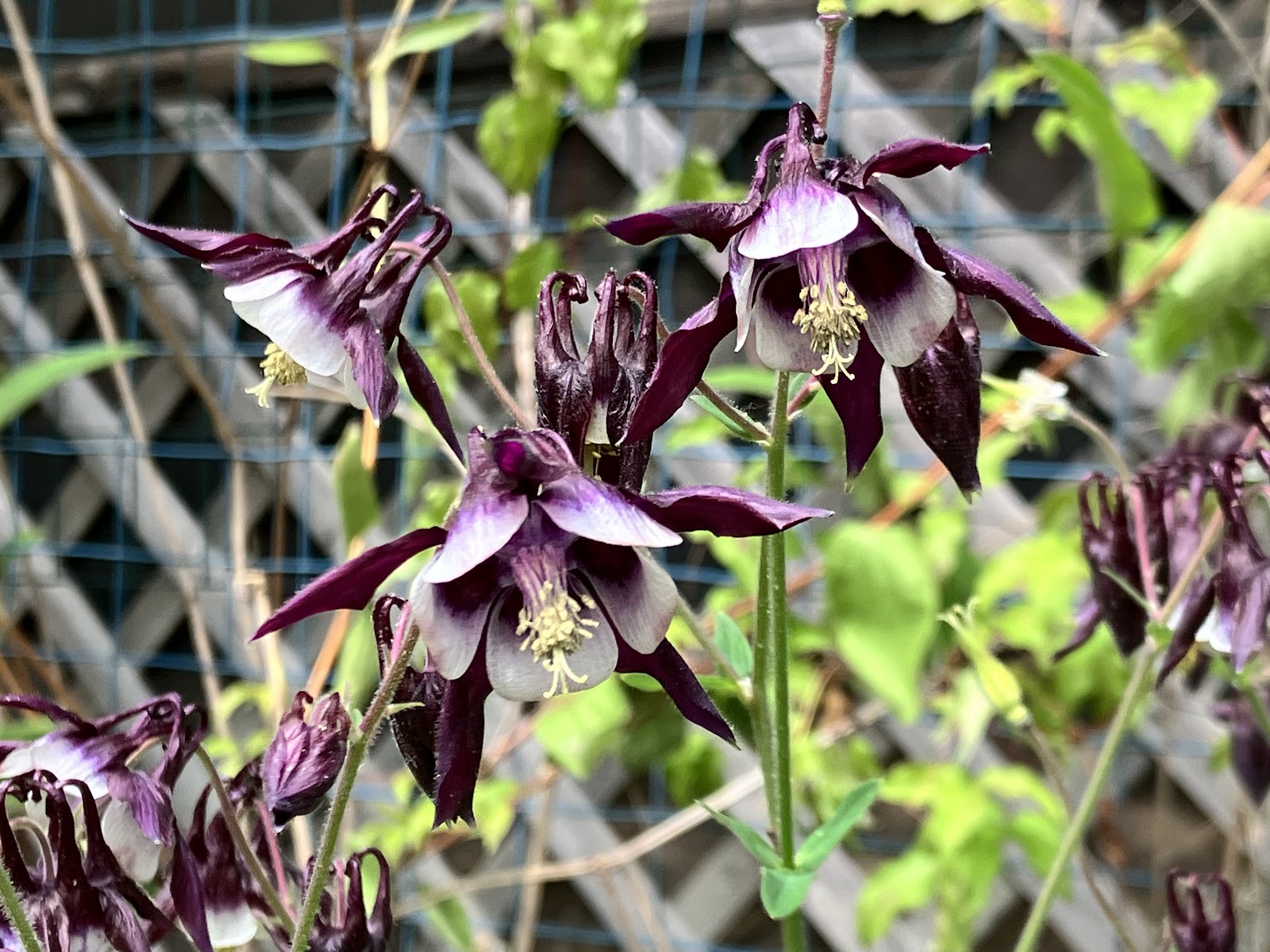Extreme Social Distancing
On the media, you may have come across stories of people protesting stay-at-home orders and not practicing social distancing. Around here, we don't have such a problem.
One day, after Mike mowed the front lawn, he came in to tell me how our neighbors really take social distancing super seriously.
"Oh, you gotta see the look in their eyes! The closer they get, the more intense they become. It is as if I were a major threat to their existence. Even with their masks on, you can sense their hostility." Mike rolled his eyes and threw his hands up in the air. "I wave and say hi, but people won't even wave back. The best they can do is to stare at me . . . " 🤨
It makes me laugh because this is a phenomenon I am used to . . . long before COVID-19 was a thing.
For the last twenty years, when I work in the garden, as I see people walk by, I wave and say hi. Very occasionally, people wave and hi back. Some people would nod to acknowledge me. Most of the people just look away or pull out their phones as if they are trying to avoid eye contact with me. Since COVID-19, this has just become even more extreme.
At first, I thought it was just my imagination. I started paying attention and began to notice that when Mike is out there, he gets some very different responses. And then I realize that if Mike is not outside with me, I am invisible to some of our neighbors . . .
"Have I done anything to offend them? Why do they ignore me?"
I brought it to Mike's attention. He was skeptical at first, but once he started taking notes, he can see a pattern. So, we started running our own little experiments.
When we go out for a walk, we walk separately -- one in front, one behind. We rotate our relative positions from time to time. Then, we walk together side by side. We say hi to people we pass, and we keep tally on people's response. The majority of the times, if we are not walking together, white folks ignore me, but most of them say hi to Mike. If we walk together, it becomes a mixed bag. But still, most people wave and say hi to Mike, not necessarily to me.
That's the pattern with white folks.
What about black and brown folks? Interestingly, people of color seem to be more open to waving, saying hi or even chatting. Just the other day, after being stared at by enough hostile white people, I came across a black family of four in front of our house. Even though we never met, we talked and joked for a little while. To celebrate our joyous encounter, I gifted them with some fresh arugula from the garden for dinner.
Before we moved from Hong Kong to settle down in "the Berkley of the east coast California ", I naively thought skin color would not be an issue. "It is Washington DC! Y2K is approaching. There is no way people still dwell on such nonsense concepts and discriminate against one another?" Boy, could I be more wrong.
I have experienced abusive and discriminatory treatments at white-dominated work environments. If not because it is so hard to demonstrate the link between the act and the illegal factors of discrimination, I would have retired at least twice long ago. My experiences led me to understand what is meant by "white privilege".
The most recent and dramatic incident was when a white woman yelled at me, curiously, in an Asian grocery store, "Do you work here? You don't work here. You don't belong here. Go back to where you come from. You're not welcomed here." It did not upset me. Maybe I was just too slow and perplexed. Being a very literal person, I was thinking: "True. I don't work here. Do you work here? I know everybody who works here. I don't think you work here. If I don't belong here, you do not belong here any more than I do!" I am glad I did not say it to her face. That happened not long after Trump was elected.
I was not born here, and I did not grow up here. The US is a beautiful country with many strengths. Yet, in the last twenty years, I get to see many dark sides of the country and its people. I cannot imagine what other people of color who were born and raised here must have experienced, particularly if they are from a disadvantaged socio-economical class, and/ or have little education.
Wherever you are on the political spectrum, I think, by now, we all agree that we need to "make America great again". Our country is broken. It is in such shambles. There is much work to be done. Maybe the silver lining of COVID-19 is that there is an important lesson for us to learn: "No one can stand alone. We are in this together." 💪
One day, after Mike mowed the front lawn, he came in to tell me how our neighbors really take social distancing super seriously.
"Oh, you gotta see the look in their eyes! The closer they get, the more intense they become. It is as if I were a major threat to their existence. Even with their masks on, you can sense their hostility." Mike rolled his eyes and threw his hands up in the air. "I wave and say hi, but people won't even wave back. The best they can do is to stare at me . . . " 🤨
It makes me laugh because this is a phenomenon I am used to . . . long before COVID-19 was a thing.
For the last twenty years, when I work in the garden, as I see people walk by, I wave and say hi. Very occasionally, people wave and hi back. Some people would nod to acknowledge me. Most of the people just look away or pull out their phones as if they are trying to avoid eye contact with me. Since COVID-19, this has just become even more extreme.
At first, I thought it was just my imagination. I started paying attention and began to notice that when Mike is out there, he gets some very different responses. And then I realize that if Mike is not outside with me, I am invisible to some of our neighbors . . .
"Have I done anything to offend them? Why do they ignore me?"
I brought it to Mike's attention. He was skeptical at first, but once he started taking notes, he can see a pattern. So, we started running our own little experiments.
When we go out for a walk, we walk separately -- one in front, one behind. We rotate our relative positions from time to time. Then, we walk together side by side. We say hi to people we pass, and we keep tally on people's response. The majority of the times, if we are not walking together, white folks ignore me, but most of them say hi to Mike. If we walk together, it becomes a mixed bag. But still, most people wave and say hi to Mike, not necessarily to me.
That's the pattern with white folks.
What about black and brown folks? Interestingly, people of color seem to be more open to waving, saying hi or even chatting. Just the other day, after being stared at by enough hostile white people, I came across a black family of four in front of our house. Even though we never met, we talked and joked for a little while. To celebrate our joyous encounter, I gifted them with some fresh arugula from the garden for dinner.
Before we moved from Hong Kong to settle down in "the Berkley of the east coast California ", I naively thought skin color would not be an issue. "It is Washington DC! Y2K is approaching. There is no way people still dwell on such nonsense concepts and discriminate against one another?" Boy, could I be more wrong.
I have experienced abusive and discriminatory treatments at white-dominated work environments. If not because it is so hard to demonstrate the link between the act and the illegal factors of discrimination, I would have retired at least twice long ago. My experiences led me to understand what is meant by "white privilege".
The most recent and dramatic incident was when a white woman yelled at me, curiously, in an Asian grocery store, "Do you work here? You don't work here. You don't belong here. Go back to where you come from. You're not welcomed here." It did not upset me. Maybe I was just too slow and perplexed. Being a very literal person, I was thinking: "True. I don't work here. Do you work here? I know everybody who works here. I don't think you work here. If I don't belong here, you do not belong here any more than I do!" I am glad I did not say it to her face. That happened not long after Trump was elected.
I was not born here, and I did not grow up here. The US is a beautiful country with many strengths. Yet, in the last twenty years, I get to see many dark sides of the country and its people. I cannot imagine what other people of color who were born and raised here must have experienced, particularly if they are from a disadvantaged socio-economical class, and/ or have little education.
Wherever you are on the political spectrum, I think, by now, we all agree that we need to "make America great again". Our country is broken. It is in such shambles. There is much work to be done. Maybe the silver lining of COVID-19 is that there is an important lesson for us to learn: "No one can stand alone. We are in this together." 💪



Meipo, I’m so sorry that you have been treated this way! If I had been talked to the way that woman in the Asian grocery store spoke to you, I would have been in tears. You are one of the strongest, most intelligent women that I know! I love you!!!
ReplyDelete